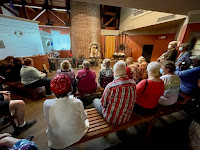There’s a universal truth that if there’s work to be done, someone has to do it – and sometimes that someone is you. A high-ranking military officer speaking at a college commencement advised graduates that the first thing they should do each morning is make the bed. Then they can go into the day knowing they’ve already accomplished something. It made such good sense to me, one of my daily habits is to get the bed made.
One of the problems lots of folks have these days is they want something done, but don’t think it’s their responsibility to do it. Whether it’s the government, their parents, or society in general, these people think they can “delegate” to others work that needs to be done.
Tim Kight, a noted leadership consultant and trainer, has a very different view: “Doctors don’t make you healthy. Nutritionists don’t make you slim. Teachers don’t make you smart. Trainers don’t make you fit. They help, but you must take responsibility and do the work.” He’s got a great point.
 |
| My drums won't play themselves - I've got to practice and do the work. |
A couple months ago, despite my much more advanced age, I decided to take drum lessons again to enhance my enjoyment with the kit. My drum teacher was a touring professional, and he’s helped me improve a lot as a drummer. But even though my instructor can teach me what I need to do to get better at playing the drums, if I don’t practice and work at it, his expertise will be wasted.
Just about everyone we greatly admire, whether a top leader, speaker, athlete or performer, would have one thing in common: Even with some special abilities, they didn’t achieve success by wishing and hoping. They did the work necessary for what they desired to achieve.
The same is true for spiritual growth. It doesn’t come automatically or by osmosis. Becoming spiritually mature and fruitful takes time, dedication – and work.
When I went on staff with CBMC (Christian Business Men’s Connection) about four decades ago, I met many highly committed, godly people. Some seemed to know the Bible forward, backward and inside-out. I marveled at how they could quickly turn to pertinent passages on virtually any topic. ‘How do they do that?’ I wondered, dubious that I could ever approach such familiarity with the Scriptures. Their “how” was simple – they were willing to put in the work.
I won’t describe myself as an “expert,” but after reading the Bible through more than a dozen times, memorizing many Scripture verses, reading books by seasoned Christian authors, sitting under excellent teaching, and then mentoring and discipling other men, I’ve made progress in knowing the Lord and applying His Word. Here’s a sampling of advice we can find in the Scriptures:
Late in his life, King David reflected on what he had learned about spiritual growth: “How can a young man keep his way pure? By living according to Your word…. I have hidden Your word in my heart that I might not sin against You” (Psalm 119:9-11).
The apostle Paul made similar observations in exhorting his young protégé, Timothy: “All Scripture is God-breathed and is useful for teaching, rebuking, correcting and training in righteousness, so that the man of God may be thoroughly equipped for every good work” (2 Timothy 3:16-17). As someone has said, be a person of the Book.
But there’s more to growing in our relationship with God than just acquiring knowledge and information. It’s also determining to put into practice what the Bible teaches. That’s why the apostle James wrote, “What good is it, my brothers, if a man claims to have faith but has no deeds? Can such faith save him?... Show me your faith without deeds, and I will show you my faith by what I do” (James 2:14-18).
In like manner, Jesus taught that spiritual maturity is a byproduct of being a faithful steward of what God gives us. He said, “Whoever can be trusted with very little can also be trusted with much, and whoever is dishonest with very little will also be dishonest with much” (Luke 16:10).
One might point out the context of this admonition is the use of material wealth, but as Jesus said in the next verse, “So if you have not been trustworthy in handling worldly wealth, who will trust you with true riches?” We don’t all have the same amount of money, but the Lord gives us all the same opportunity to acquire the “true riches” of knowing Him and living as His faithful and fruitful children.
In yet another passage, Paul wrote about the importance of not keeping to ourselves the truth and spiritual understanding God gives us. Addressing Timothy again, he said, “And the things you have heard me say in the presence of many witnesses entrust to reliable (faithful) men who will also be qualified to teach others” (2 Timothy 2:2). What we have learned, the Lord expects us to pass along to others.
Would you like to become known as a man or woman of God? It’s not easy, it takes time and effort – lots of work – but it’s worth it. As God said through the prophet, “Then you will call upon me and come and pray to me, and I will listen to you. You will seek me and find me when you seek me with all your heart” (Jeremiah 29:12-13).










